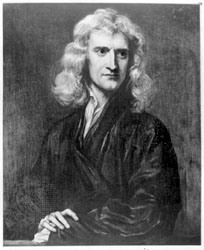

Newton :
Sir Isaac Newton (b. Dec. 25, 1642 [Jan. 4, 1643, New Style], Woolsthorpe, Lincolnshire, Eng.--d. March 20 [March 31], 1727, London), English physicist and mathematician who invented the infinitesimal calculus, laid the foundations of modern physical optics, and formulated three laws of motion that became basic principles of modern physics and led to his theory of universal gravitation. He is regarded as one of the greatest scientists of all time.
Newton received a bachelor's degree at Trinity College, Cambridge, in 1665. During the next two years while the university was closed because of plague, Newton returned home, where he thought deeply about how certain natural phenomena might be explained and formulated the bases of his first major discoveries. He returned in 1667 as a fellow to Trinity College, where he became Lucasian professor of mathematics in 1669.
In 1666 Newton discovered the nature of white light by passing a beam of sunlight through a prism. He invented the calculus about 1669 but did not formally publish his ideas until 35 years later. He built the first reflecting telescope in 1668. Newton's most famous publication, Philosophiae Naturalis Principia Mathematica (1687; Mathematical Principles of Natural Philosophy), contains his work on the laws of motion, the theory of tides, and the theory of gravitation. His laws of motion laid the basis for classical mechanics, and the theory of gravity was particularly important in working out the motions of the planets. The Principia has been called one of the most important works of science ever written. In another book, Opticks (1704), Newton described his theory of light as well as the calculus and other mathematical researches.
Newton served as warden of the Royal Mint from 1696 and became president of the Royal Society in 1703, holding this office until his death. In 1705 he became the first British scientist ever to receive
Excerpt from the Encyclopedia Britannica without permission.